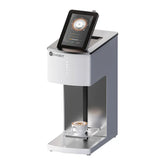The Ultimate Checklist for Eco-Friendly Coffee Drinking
In a world increasingly aware of its environmental impact, making small yet significant lifestyle changes can contribute greatly to reducing our environmental footprint. One beloved daily habit that many of us share – coffee drinking – offers a perfect opportunity to make such eco-friendly changes. By paying attention to the items we use in our coffee routines and making smarter choices, we can enjoy our morning cup with a clearer conscience. Here's your ultimate checklist for eco-friendly coffee drinking.
1. Choose Sustainable Coffee Beans
The foundation of eco-friendly coffee drinking starts with your choice of coffee beans. Look for coffee that is certified organic, Fair Trade, or Rainforest Alliance certified, as these labels ensure that the cultivation of the beans is better for both the environment and the growers.
2. Use a Reusable Filter
If you're a fan of drip coffee makers, opt for a reusable coffee filter. Not only does this reduce paper waste, but reusable filters can also extract oils from the coffee that paper filters might miss, potentially enhancing your coffee's flavour.
3. Opt for a Non-disposable Mug
Single-use cups contribute considerably to landfill stress. A high-quality reusable mug or travel thermos is a must-have for eco-conscious coffee drinkers. They are often better insulated, keeping your coffee hotter for longer.
4. Think About Your Creamers and Sweeteners
Dairy production has a significant environmental impact. If you want to reduce your carbon footprint further, consider plant-based milks and natural sweeteners or opt for black coffee if you prefer it that way.
5. Get Creative at Home
With technology like the PrintPen from Evebot Store, you can add creativity to your coffee without compromising your eco-friendly principles. The PrintPen utilises FDA Certified edible ink, allowing you to adorn your coffee or accompanying treats with art without any environmental downsides associated with typical mass-produced products.
6. Compost Coffee Grounds
Coffee grounds are packed with nutrients beneficial to plants, making them excellent for composting. By creating a dedicated spot in your garden for composting or joining a local composting programme, you can ensure that your coffee grounds contribute to a sustainable cycle of use.
7. Support Local Coffee Shops
Supporting local coffee shops that prioritise eco-friendly practices can also make a big difference. Many independent cafés source their ingredients sustainably, and when you choose to support them, you bolster an economy that fits ecological sensibilities.
Conclusion
Transitioning to eco-friendly coffee drinking doesn't require drastic changes. By incorporating just a few of these tips into your routine, you can help protect our planet while still indulging in your favourite daily ritual. Remember, every small step counts towards a larger collective effort in caring for our environment.
For more innovative products to complement your sustainable lifestyle, visit Evebot Store today.







